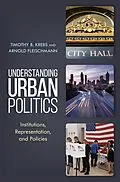In Understanding Urban Politics: Institutions, Representation, and Policies, Timothy B. Krebs and Arnold Fleischmann introduce a framework that focuses on the role of institutions in establishing the political "rules of the game," the representativeness of city government, the influence of participation in local democracy, and how each of these features influences the adoption and implementation of public policies. Part 1 lays the groundwork for the rest of the book by exploring the many meanings of "urban," analyzing what local governments do, and providing a history of American urban development.
Part 2 examines the organizations and procedures that are central to urban politics and policy making: intergovernmental relations, local legislatures, and the local executive branch. Part 3 looks at elections and voting, local campaigns, and non-voting forms of participation. The four chapters in Part 4 focus on the policy process and the delivery of local services, local government finances, "Building the City" (economic development, land use, and housing), and policies affecting the quality of life (public safety, the environment, "morality" issues, and urban amenities).
Krebs and Fleischmann bolster students' learning and skills with guiding questions at the start of each chapter, which ends with key terms, a summary, discussion questions, and research exercises. The appendix and website aid these efforts, as does a website for instructors.
Autorentext
Timothy B. Krebs is professor of political science at the University of New Mexico, where he joined the faculty in 2002 after four years at the University of North Carolina at Greensboro. His teaching includes undergraduate and graduate course in American politics, urban politics, urban management, state and urban policy, and campaigns and elections. Krebs received his B.A. from Loyola Marymount University in Los Angeles and earned his Ph.D. from Loyola University Chicago in 1997. His publications have appeared in the American Journal of Political Science , American Politics Research , Political Research Quarterly , Social Science Quarterly , Urban Affairs Review and other outlets.
Arnold Fleischmann is professor of political science at Eastern Michigan University, where he served as department head from 2009 to 2016; prior to that, he taught at the University of Georgia for 26 years. He teaches American Government, State and Local Government, Urban Politics, and State Politics. He is coauthor of The Politics in Georgia , published by the University of Georgia Press, which is now in its third edition.
Klappentext
In Understanding Urban Politics: Institutions, Representation, and Policies, Timothy B. Krebs and Arnold Fleischmann introduce a framework that focuses on the role of institutions in establishing the political "rules of the game," the representativeness of city government, the influence of participation in local democracy, and how each of these features influences the adoption and implementation of public policies. Part 1 lays the groundwork for the rest of the book by exploring the many meanings of "urban," analyzing what local governments do, and providing a history of American urban development. Part 2 examines the organizations and procedures that are central to urban politics and policy making: intergovernmental relations, local legislatures, and the local executive branch. Part 3 looks at elections and voting, local campaigns, and non-voting forms of participation. The four chapters in Part 4 focus on the policy process and the delivery of local services, local government finances, "Building the City" (economic development, land use, and housing), and policies affecting the quality of life (public safety, the environment, "morality" issues, and urban amenities). Krebs and Fleischmann bolster students' learning and skills with guiding questions at the start of each chapter, which ends with key terms, a summary, discussion questions, and research exercises. The appendix and website aid these efforts, as does a website for instructors.
Inhalt
Preface About the Authors Part 1: Laying the Groundwork Chapter 1: Studying Urban Politics
- First Things First: What is 'Urban,' Anyway?
- What's Different about Local Government and Politics?
- Types of U.S. Local Governments and What They Do
- The World of Local Governments
- History as a Lens for Understanding Urban Politics
- Pre-industrial Cities
- Urban Development from the 1870s to World War I
- The 1920s through World War II
- Suburbanization and Minority Concentration in Central Cities
- Postwar Urban Development and Politics
- New Urban Regions and Groups in the Late 20th Century
- Urban Development in the 21st Century
- Local Governments in the American Federal System
- State Limits on Local Governments
- Federal Efforts to Influence Local Governments
- Dealing with Other Governments
- Institutional Context of Local Legislatures
- The Functions of City Councils
- Representing Constituents
- The Context of Mayoral Leadership
- Mayoral Leadership: Formal and Informal Sources of Powers
- City Managers and Administrators
- The Urban Bureaucracy
- Local Constitutional Officers
- Urban Electoral Process
- Voter Turnout in Urban Elections
- Voter Choice in Urban Elections
- From Group-Based to Candidate-Centered Elections
- Institutional Context of Urban Candidates and Campaigns
- Urban Campaigns
- Non-Voting Forms of Participation in Urban Politics
- Citizen Contacting
- Political Parties and Urban Interest Groups
- Political Campaigning
- Protests and Rebellions
- Voting with Your Feet
- The Policy Process
- Types of Policies
- Providing Local Services
- Alternative Service Methods
- Local Government Spending
- Local Government Revenue Sources
- Local Government Budgeting
- Economic Development Policies
- Land Use
- Housing
- Critical Issues in the Shaping of Urban America
- Public Safety
- Environmental Policies
- Urban Amenities
- Morality Politics: Battling over Community Values
